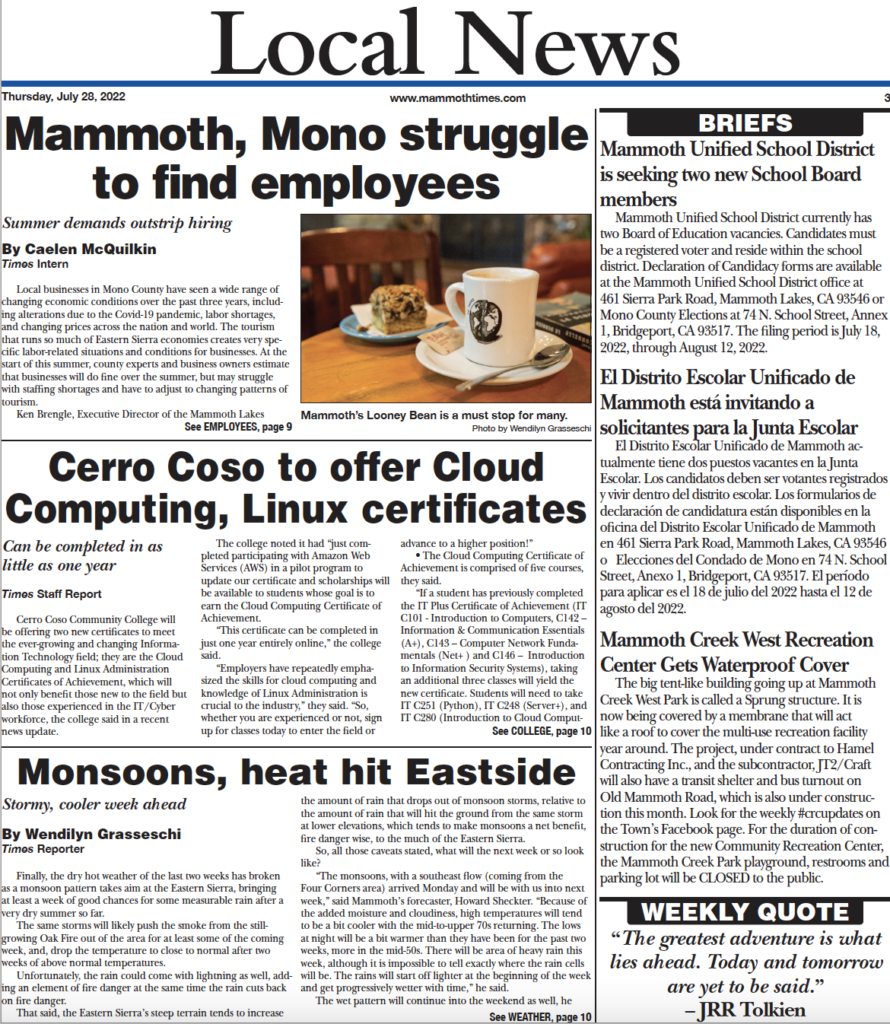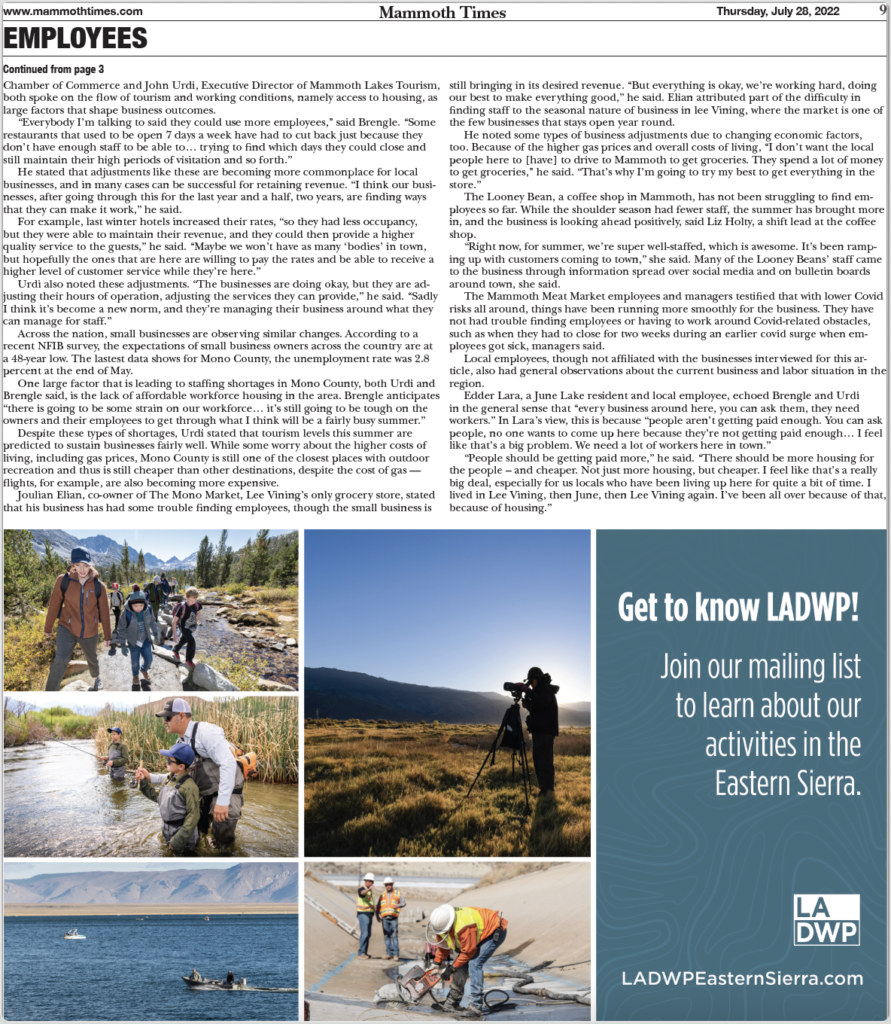Summer Demands Outstrip Hiring
Published in The Mammoth Times on July 28, 2022


Local businesses in Mono County have seen a wide range of changing economic conditions over the past three years, including alterations due to the Covid-19 pandemic, labor shortages, and changing prices across the nation and world. The tourism that runs so much of Eastern Sierra economies creates very specific labor-related situations and conditions for businesses. At the start of this summer, county experts and business owners estimate that businesses will do fine over the summer, but may struggle with staffing shortages and have to adjust to changing patterns of tourism.
Ken Brengle, Executive Director of the Mammoth Lakes Chamber of Commerce and John Urdi, Executive Director of Mammoth Lakes Tourism, both spoke on the flow of tourism and working conditions, namely access to housing, as large factors that shape business outcomes. “Everybody I’m talking to said they could use more employees,” said Brengle. “Some restaurants that used to be open 7 days a week have had to cut back just because they don’t have enough staff to be able to… trying to find which days they could close and still maintain their high periods of visitation and so forth.” He stated that adjustments like these are becoming more commonplace for local businesses, and in many cases can be successful for retaining revenue. “I think our businesses, after going through this for the last year and a half, two years, are finding ways that they can make it work,” he said.
For example, last winter hotels increased their rates, “so they had less occupancy, but they were able to maintain their revenue, and they could then provide a higher quality service to the guests,” he said. “Maybe we won’t have as many ‘bodies’ in town, but hopefully the ones that are here are willing to pay the rates and be able to receive a higher level of customer service while they’re here.”
Urdi also noted these adjustments. “The businesses are doing okay, but they are adjusting their hours of operation, adjusting the services they can provide,” he said. “Sadly I think it’s become a new norm, and they’re managing their business around what they can manage for staff.”
Across the nation, small businesses are observing similar changes. According to a recent NFIB survey, the expectations of small business owners across the country are at a 48-year low. The latest data shows for Mono County, the unemployment rate was 2.8 percent at the end of May.
One large factor that is leading to staffing shortages in Mono County, both Urdi and Brengle said, is the lack of affordable workforce housing in the area. Brengle anticipates “there is going to be some strain on our workforce… it’s still going to be tough on the owners and their employees to get through what I think will be a fairly busy summer.”
Despite these types of shortages, Urdi stated that tourism levels this summer are predicted to sustain businesses fairly well. While some worry about the higher costs of living, including gas prices, Mono County is still one of the closest places with outdoor recreation and thus is still cheaper than other destinations, despite the cost of gas — flights, for example, are also becoming more expensive.
Joulian Elian, co-owner of The Mono Market, Lee Vining’s only grocery store, stated that his business has had some trouble finding employees, though the small business is still bringing in its desired revenue. “But everything is okay, we’re working hard, doing our best to make everything good,” he said. Elian attributed part of the difficulty in finding staff to the seasonal nature of business in lee Vining, where the market is one of the few businesses that stays open year round.
He noted some types of business adjustments due to changing economic factors, too. Because of the higher gas prices and overall costs of living, “I don’t want the local people here to [have] to drive to Mammoth to get groceries. They spend a lot of money to get groceries,” he said. “That’s why I’m going to try my best to get everything in the store.”
The Looney Bean, a coffee shop in Mammoth, has not been struggling to find employees so far. While the shoulder season had fewer staff, the summer has brought more in, and the business is looking ahead positively, said Liz Holty, a shift lead at the coffee shop.
“Right now, for summer, we’re super well-staffed, which is awesome. It’s been ramping up with customers coming to town,” she said. Many of the Looney Beans’ staff came to the business through information spread over social media and on bulletin boards around town, she said.
The Mammoth Meat Market employees and managers testified that with lower Covid risks all around, things have been running more smoothly for the business. They have not had trouble finding employees or having to work around Covid-related obstacles, such as when they had to close for two weeks during an earlier covid surge when employees got sick, managers said.
Local employees, though not affiliated with the businesses interviewed for this article, also had general observations about the current business and labor situation in the region.
Edder Lara, a June Lake resident and local employee, echoed Brengle and Urdi in the general sense that “every business around here, you can ask them, they need workers.” In Lara’s view, this is because “people aren’t getting paid enough. You can ask people, no one wants to come up here because they’re not getting paid enough… I feel like that’s a big problem. We need a lot of workers here in town.”
“People should be getting paid more,” he said. “There should be more housing for the people – and cheaper. Not just more housing, but cheaper. I feel like that’s a really big deal, especially for us locals who have been living up here for quite a bit of time. I lived in Lee Vining, then June, then Lee Vining again. I’ve been all over because of that, because of housing.”